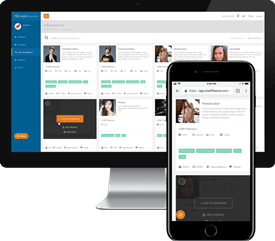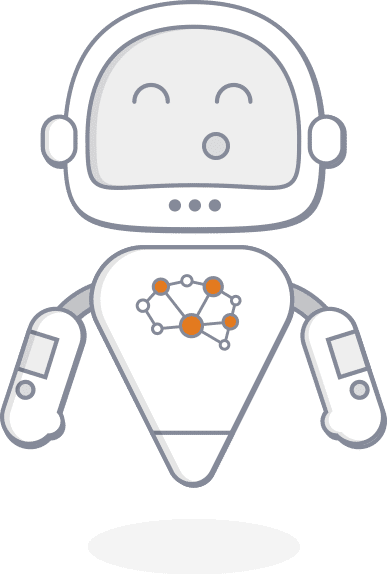Last Updated on January 7, 2021
For more than 12 years, Vix Reitano has worked in-house and as a consultant for some of the largest brands worldwide including The United Nations, ABC, NBC, AOL and Time, Inc., to name just a few. Vix describes herself as a “Jane of all Trades” who manages teams efficiently and effectively by providing data-driven solutions with realistic execution goals and a proven track record of success. Vix has been featured in Salon.com, Buzzfeed and USA Today. In 2015, Vix founded her creative digital agency in New York City and later self-published a book called Six Weeks to Freedom, available on Kindle. Check out dominatedigitalmedia.com to learn more or follow Vix on Facebook, Instagram and Twitter, to name a few.
Can you tell us a little bit about your background and how you got into marketing in general and then also influencer marketing as well?
So I have over 12 years of experience in marketing. I started as a journalist, I worked at ABC, NBC Telepictures, managed brands for Time Inc. And then I kind of fell into influencer marketing because we were doing that, but we weren’t calling it that. It definitely was a little bit of a back way into it. And then as an influencer myself, I really built up my business in 2015 leveraging my digital brands. I built a six figure business in six weeks just using my connections.
As a consultant and a founder of a creative digital agency, do you have some career highlights or some memorable moments that stand out to you?
So many. One of the most memorable moments was going to the 2013 Oscars with Live with Kelly and Michael, which was incredible. I was a digital producer there and it was my job to count 27,000 entries from the Oscar contest that I was running as the digital producer. So that was incredible. I’ve also met so many celebrities in working in television. Another moment that was a real highlight for me was before I even really started my journey in 2011, I leveraged Twitter to get on The Today Show as a guest. And David Gregory interviewed me and that was like a super cool thing. I’m a New Yorker, born and bred. So to me, to be on The Today Show was just an incredible experience. And I’m trying to think. Another really cool highlight, well, as a journalist working with Meredith Vieira was a huge win for me, getting to meet her.
And she’s like one of the greats, so that was a really cool experience. Yeah, there’s so many moments, almost too many to name. One more when I had my company was when we shot live video on Mevo, I don’t know if everybody knows what that is, but it was a small camera that used to shoot live really quickly. Still does, not everybody uses it. But I did it at the UN General Assembly for a project I was working on and that was super cool.
You might’ve touched on it earlier, but what led you to write Six Weeks to Freedom, your book on Kindle?
I self published that because I had basically built my business so quickly and people kept asking how I did it. And really, it was a lot of quick, savvy strategies that I used to keep my network connected and also to let people know what I was doing. I got tired of telling the story, I guess, is the best way to put it. So I put it all in one place and people can actually get the first chapter for free if they go to my website. I share that because I think it’s really important to get a sense of who you are as a person and writing the book helped me learn a little bit more about that, but then it also goes into the strategies that I use to stay connected to people and also how I focused on finding additional opportunities, which I think are super relevant for influencers today.
How do you balance all of your responsibilities as a business owner and an influencer while taking time to unwind and relax every now and again?
Yeah, I mean, I read like three books a week. I listen to a ton of podcasts. So I am not just all business. And I think that’s the challenge, right? When you create content for fun and for payment, sometimes you seem like that’s all you do. But one of the things that I, one of the things that made a big difference for me was the book 168 Hours by Laura Vanderkam. I read it when I first started my career in my early twenties. And as a journalist, I had a lot to manage. I always did. So every job I’ve ever had was very focused on juggling a lot of things. And in the book, she goes into how there are one hour blocks, but there’s 168 of them in a week. So as I started to think about it that way, it really helped me get clear on my calendar, my goals, and how to stay productive. And to this day, and I read that book almost 15 years ago now, 13, 14 years ago, to this day, I still leverage those tactics that I learned and then put a little Vix fix on to really help myself stay grounded and connected.
I still have notebooks that I write things in. I’m, I would say, 96% digital. I like to write my to do list on a piece of paper, but I love Slack, Asana and Airtable. So yeah, for me, it’s really about understanding what I want in the three areas of my life, personal, professional and my mindset slash spirituality, whatever you want to call it. And making sure that each of those buckets is filled each and every day. Because as I said earlier to someone, you can’t have the impact that you want to have if you yourself are not intact, if you are not complete and whole and supported.
As someone with years of experience in marketing, what advice do you have for influencers who are just getting started or even just maybe just in the preliminary stages of thinking about getting into and/or making a go with influencer marketing?
I actually did an IGTV video on this today, so this has been very much on my mind. It’s synchronistic that it came up. One thing for me is you don’t have to have a massive audience to make an impact. That’s the first thing. You can make an impact. Nano influencers are a huge part of the industry because the larger influencers have lost touch with their community. So my second thing is to focus on community early and often. Make sure that you are engaging and having a two way conversation because as you get bigger, that will be harder. But it doesn’t mean that you should stop trying.
And another thing is to not be afraid to reach out to brands. I worked with an influencer who had under a thousand followers and got a $500 deal plus product with a skincare brand. And it was just because their community was so engaged and they were an engaging human being. So it’s not about being the best at shooting content, and you will and should learn those skills, right? You have to develop your skills as a creator. But if you’re just getting started, there’s no rule that says you can’t get paid for content. Obviously, you also have to be willing to do things for product and willing to grow and expand. But there’s no rule that says that you can’t succeed with 10,000 followers or less. There’s lots of opportunity. And I think Intellifluence is one of the tools that I really recommend because having that access makes a huge difference. And also, brands reach out to you. So you learn how to have that communication.
Where do you see influencer marketing headed in the next five years or so?
Five years is a very, very long lookout. If you asked me five years ago, I don’t necessarily think I would have bet on Instagram in the way that it has exploded. Instagram was such an isolated community. One thing that I will say, Cisco says and I have believed this for a long time, that over 80% of all traffic, I believe the correct stat is 83%, but let’s just go with over 80% of all traffic will be driven by video this year in 2020. That’s huge. So if you are not thinking of a video first strategy, whether it’s Tik Tok or Byte, Byte is the new version of Vine, for those who aren’t on the platform. Don’t put your Tik Toks on Vine, on Byte. There’s actually a whole chain about don’t put your Tik Toks here, don’t share your Tik Toks here. There’s all these viral videos. So it’s really important to follow what’s happening. Understand that video is going to be important, but different types of video for different platforms. And I think influencers make that mistake. They’re like, “Well, I’ll just reshare it everywhere.” You can’t do that because the different communities require different things. So that’s another thing that I’m seeing is really specialized content per platform, especially as the content requirements shift. So we have six seconds, 15 seconds, 30 seconds, et cetera. That’s a trend.
And another thing is that brands, in my opinion and experience, are going to ask you about your conversions. Like you didn’t have to have conversions or clicks or know anything about those metrics. But every vertical, every niche, every influencer needs to be at least metrics educated, not metrics expert. You do have to really understand the power because the more information you can give a brand, the more comfortable they feel with investing with you. And I see longterm collabs as something that’s going to become much more popular instead of these one-off user generated content campaigns, I think they’re going to have more so influencer and ambassadors. And finally, I think influencers are going to have a unique opportunity to create products because people trust their friends and people treat influencers as their friends. So if you are not diversifying from day one, then you are kind of selling yourself short.

Andrew is the Head of Client Services for Intellifluence and has a background in communications. He is committed to helping brands get the most out of their campaigns and is the co-host of the Influencer Spotlight series.





